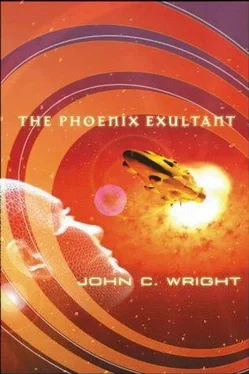He went on to describe the situation in some detail. He explained his plan to introduce Neptunian forms among the Afloats, to generate capital, so that he could afford to persuade the Neptunians to hire him as pilot for the Phoenix Exultant. He knew the poverty-stricken Neptunians, without aid, probably did not have the money necessary even to ship the Phoenix Exultant from Mercury Equilateral to the outer system.
He concluded: "... Therefore the only salvation for which I can hope must come from you. Not truly an exile yourself, it is possible Antisemris and his deviant customers will treat with you, and be willing to carry messages from you to the Neptunian Duma. Only if contact with my friend Diomedes, and with the newly founded Silver-Grey houses among the Neptunians, is established and maintained, can the Phaethon Stellar Exploration Effort be resurrected. Can you carry these messages and offers to them for me?"
The slate encoded the messages as a series of chemical signals and pheromones. Phaethon drew out a few grams of his black suit-lining, and imprinted the nanomachinery substance with those signals. He threw that scrap into the water.
A moment later a small night bird (belonging to Daughter-of-the-Sea, he hoped) pecked at the scrap, swallowed it, and flew off.
Gram by gram, his nanomachinery was vanishing. He could not suppress a twinge of regret as he watched the little bird fly off.
He settled himself to wait. Daughter-of-the-Sea, a Cerebelline, did not have a unified structure of consciousness. The various parts of the mental networks that served her as cortex, midbrain, and hindbrain were scattered among three acres of bush and weed and wiring, pharmicon groves, insect swarms, and bird flocks. Not every part communicated with every other by the same medium or at the same time rates. A thought coded as electricity might take a microsecond to travel from one side of the underbrush root system to another, a thought coded chemically, or as growth geometries, might take hours, or years.
Phaethon wondered why anyone would volunteer to have such a disorganized and tardy consciousness. But then again, the Invariants and Tachystructuralists no doubt wondered the same thing about Phaethon's clumsy, slow, organic, multilev-eled, and all-too-human brain.
And so it was with considerable surprise that Phaethon saw his slate light up with a reply before even half an hour had gone by. Daughter-of-the-Sea must have reconstructed part of her consciousness, or assigned a special flock of thought carriers, to maintain near-standard time rates just for his sake, in case he should call. He was touched.
The reply was radiating in the form of inaudible pulses from a group of medical bushes and vines clinging to the southern cliff shore.
The translation ran: "Anguish is always greater than the words we use to capture it. Can I attempt to express my soul unblamed? What are your thoughts but little lights, glinting in through all the stained-glass panes of words, burning in the loneliness of your one skull? And you would have me cast such light as that toward eyes of blind Neptunians. Where is coin enough to burn within the Pharos of such high desire, that I might make a bonfire even giants envy, and cast so bright a beam across so wide a night? And to what end? Success shall gather Phaethon to heaven, to struggle with silent monsters in the wide star-interrupted dark; or failure pull down Phaethon into a lonely pauper's tomb beneath some nameless stone. In either fate, bright Phaethon departs, all his fire lost, to leave me, Daughter-of-the-Sea, again in misery and solitude on this frail, saccharine, spiritless, thin-winded, green-toned world I so despise."
Phaethon frowned. Struggle with silent monsters in the dark? Did Daughter-of-the-Sea expect Phaethon to conduct some sort of war with whatever had been left of the Second Oecumene? Perhaps these "silent monsters" were a metaphor for the various forces of inanimate nature with which any engineer must struggle as he builds. No matter. One could not expect to understand everything even people of one's own neuroform meant to say.
But he understood the thrust of the message. Daughter-of-the-Sea wanted to know what was in the deal for her.
Phaethon had the translator cast his reply in the same florid mood and metaphor as hers: "I will create for you, out of some rock or cometary mass circling Deneb or far Arcturus, a world to be the bridegroom of your delight. All shall be as your desires say. The angry clouds of long-lost Venus shall boil again with the drench of stinking sulfur in that far world's atmosphere, and never need you breathe this thin and listless air of Earth again. Tumultuous volcano-scapes shall flood a trembling surface, immense as any laughter of a god within your ears, and once more shall you watch as hurricanes of acid pour in flame from ponderous black skies of poison into reeking seas of molten tin. You will be embodied such as you once were on Venus, Venus as she was so long ago! And veneric organs and adaptions (which find no other place or purpose, old Venus lost) now shall bloom from you again, to yield to you those hot, strange, powerful sensations, unknown to any Earthlike eyes, those sensual impressions that your memories so faintly echo. Come! Aid me now! And once the Phoenix Exultant is mine again, she shall nest within the circle of the Galaxy, and brood, as her young, a thousand shining worlds."
It was the same offer he had made Notor-Kotok. Chemical codes appeared on the translation screen, and again he took up another precious gram of his limited nanomaterial, impregnated the message into it, and dropped it into the waters.
A night bird gobbled it.
It was Greater Midnight when Phaethon went belowdecks to perform his evening oblations. This included a feeding hardly worthy of the name "mensal performance" (he merely slapped nutrients into his cloak-lining, and let the cloak feed him intravenously). Next, he underwent a careful and very spartan sleep cycle. Finally, he did an exercise of adjustment to his neurochemistry, which he encompassed in a ceremony called "Answering the Circle." This ceremony dated from the early Fourth Era, and had originally been used to restore weary members of vast group-minds to their proper health and courage and purpose.
It was hours later, in the dead of night, near Lesser Midnight (as Jovian Midnight was called) when Phaethon emerged on deck again. The slate showed a response from Daughter-of-the-Sea had arrived, this time, from another center of her consciousness housed in filtration grasses somewhat inland of here. The slate was not complex enough to tell him if this part of her mind was analogous to a "conscious" level, or if this was a subconscious reaction, something like a dream. "Poor- seed-scatter-answer-dark/masked/approaching-bright promises sowed-accept-a world to keep you gently chained? Now comes one."
He ran two other reconstructions through the translator, attempting other modes. The parts of the message unfolded and were interpreted into a coherent format: "Lacking wealth or prestige, lacking funds or friends enough to buy or beg what media Phaethon requires to communicate to his remote Neptunians, Daughter-of-the-Sea this night emanates your message out through several modes. By land and sea and sky it spreads, by light, by speech, by printed letters such as are known no more, save among the far-past-loving Silver-Grey. Each message, scattered like a thousand wanton seeds, recites the promise of rewards to come to whoever might carry it one further step along. In your name, I promised them each gram devoted to your cause would be returned a hundredfold, and any exile ostracized on your behalf would be given a world of his own. Surely uncounted hundreds of these messages were simply consumed by silence, seeds spread on rocky soil.
Читать дальше











